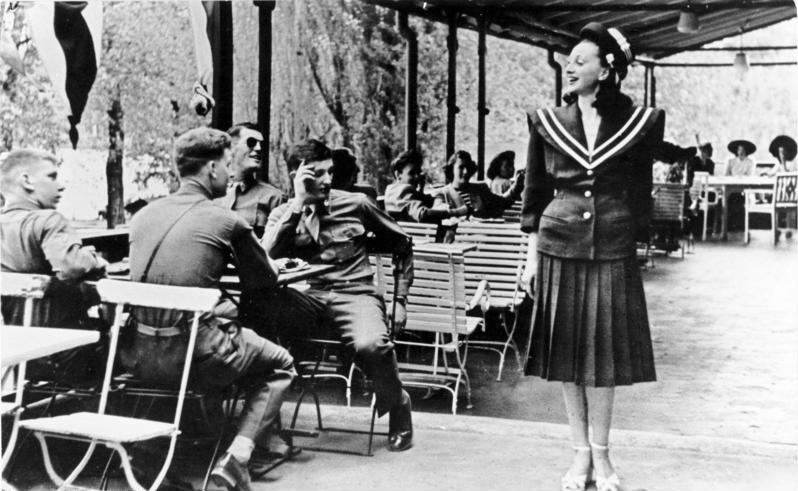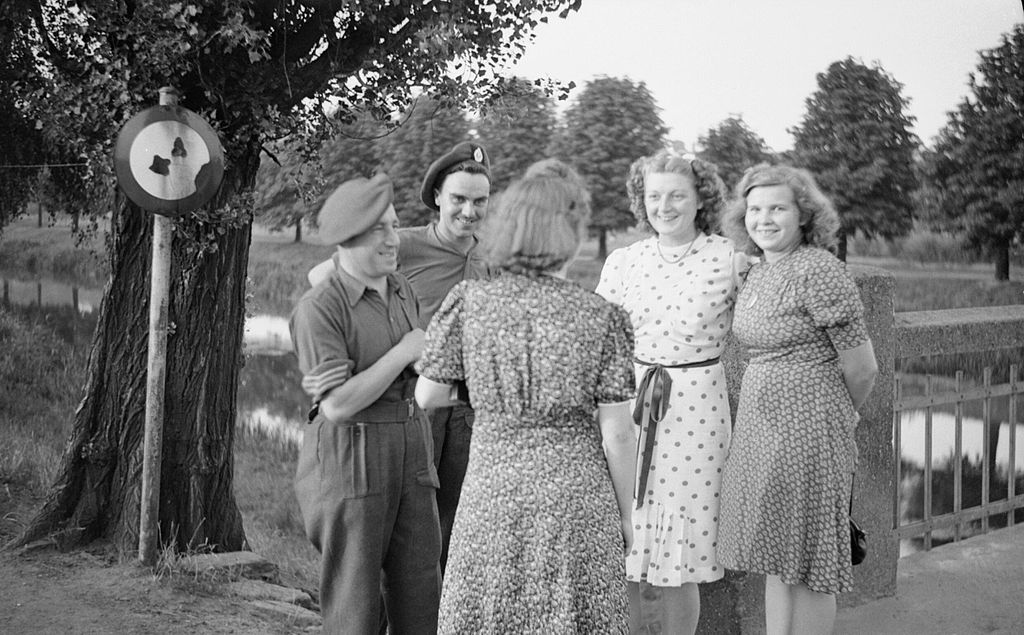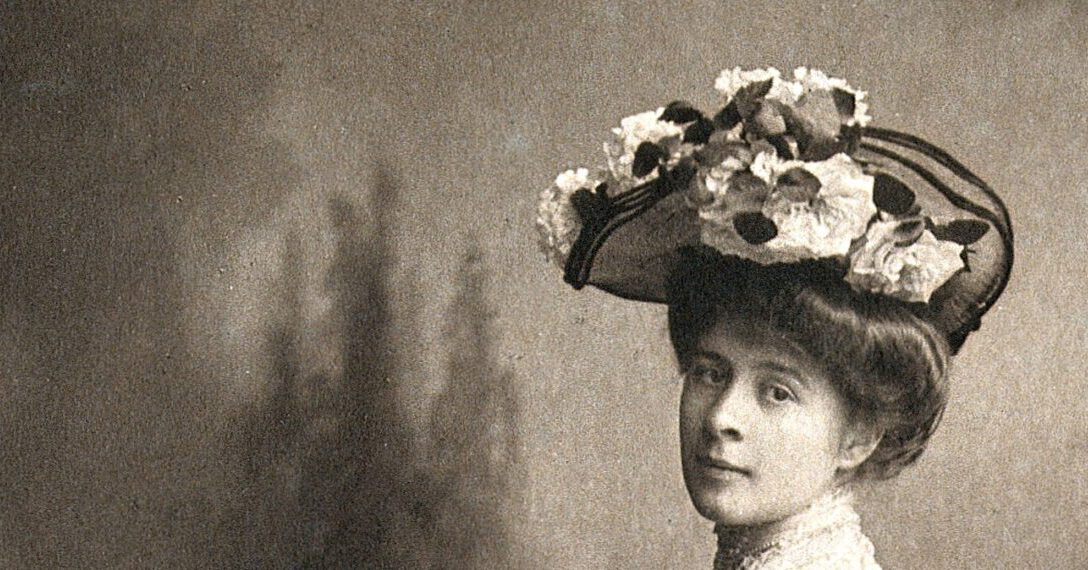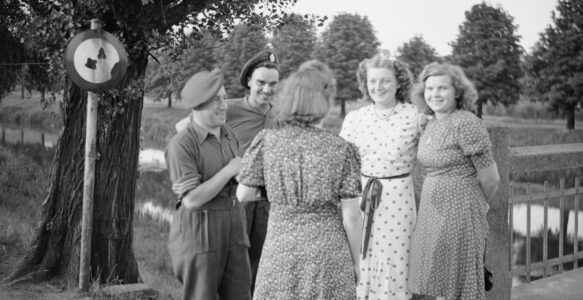Berlin, 1945
You’re an actor and you want to get into the mind of someone who lived through the Second World War. You want to play soldier after WW2, or create the backstory for a civilian character from the 1940s or 1950s. Well, fancy meeting you here! I am a historical consultant. My name is Dr. Barbara and I’m located in lovely Germany. This is what I would do in collaboration with an actor. Let me guide you through an entire scene.
Film: British Pathé (fair use)First, click here to watch this original film footage from 1945.
What do we see? »Various shots of couples dancing in a nightclub« reads the explanation. The British Pathé films decriptions adds:
- »Some of the men are in uniform
- seems to be all nationalities(!)
- the women are in civilian clothing
- a waitress walks by with trays of drinks
- a female Russian soldier pushes past the couples on the dance floor
- Could be the end of the fraternisation ban.«
Let’s assume that this is the end of the ban on fraternisation: Before, it was forbidden to even talk to foreign soldiers. You could not meet them, you could not have a relationship with them. The German government wanted to prevent the German people from hearing other points of view, which would have tainted the picture they were trying to paint of a superior German race. They also wanted to prevent espionage. —
This ban on contact would have been lifted. Couples who had to meet in secret would now be able to meet officially. For the first time in over 5 years, young German women would have the chance to meet British men. And the British soldiers would have had a bit more freedom of movement, and not just between soldiers.
Your turn: write down ideas how to play this.
Tell how a couple — a British soldier and a young German woman — who have just met, go out for the first time. Or have they met before, in secret, and this is the first time they have gone out together »officially«, without having to hide?
Describe how the evening begins. How the couple are still shy until the man finally asks the lady if she would like to dance?
Describe the scene from his point of view and then from hers. Writing helps a lot when you want to play a soldier after WW2, so write it down.
In an internal monologue, describe the fears and inner thoughts of both the British soldier and the German woman. Some ideas to get you started…
Include a flashback to how they prepared for the evening.
How did he prepare in his soldier’s barracks, before he came to the nightclub? Does he still feel comfortable wearing his uniform? Describe his feelings towards the German inhabitants and himself as part of the occupying forces that won the war. For him, describe how his uniform looks. To get an impression, peruse this book. Choose a British soldier’s rank, and the matching uniform.
How did she dress for the occasion? Did she have her own dress, or did she borrow one from a neighbour or friend? For her, watch a video on how to prepare a 1940s hairdo here. Then describe how the woman brushes and styles her hair, in order to prepare for the occasion. Again, write everything down.

When you watch the original footage again, pay attention to the small details.
The following details were very special in the days of 1945. The value of these things felt so much higher than it does today.
- Cigarettes — They were almost a »secret currency« in those post-war days.
- Alcohol — The waitresses bring trays and trays of glasses full of drinks.
- Jazz music — Try to retrace how the German girl must feel listening to jazz music, which had been strictly forbidden in Germany during the Nazi era. Young people who listened to or played jazz were taken to prison, work camps or even concentration camps(!). But now, all of a sudden, it’s OK to listen to this lively, upbeat jazz music again.
- Uniforms vs. civilian clothes — Try to understand how you feel as a German woman who has been taught for years that British, American and Russian soldiers are their worst enemies, and yet you find yourself dancing in the middle of a crowd of German women, dancing with »the enemy«. Imagine that these foreign soldiers might potentially have shot one of their fathers, brothers or friends in combat. And now everyone is here together, dancing.
While creating a general »feel« for the situation, music is crucial. Many of my clients love playlists to help them get into the headspace of a particular period, so check out this one: Music from the year 1945 / Die Schlager des Jahres 1945 If you scroll down a bit, there’s a playlist that you can listen to for free. You will recognise that there are a bunch of German songs. But there are also many English and American songs on this playlist.
Over to you: Listen to 3 songs — whether English or German
If you have chosen German songs, look up the lyrics by doing a quick online search. Use Google Translate to get an idea of what the lyrics are about. You will notice that most of the lyrics are happy and positive, and many of them are about first love. Other songs are old soldier songs, like the song »Lili Marlene«, which you can find as an English (!) version on the playlist. Perhaps an idea for a scene where both he and she know the words, and each of them can sing along in their own language? If you prepare to play a soldier after WW2, try this. Try to embody their feelings as they listen to the music — especially after the atrocities of war, and now facing the daily hardships of post-war life. Let them enjoy their new-found freedom to the fullest.
Don’t forget: The post-war days of the 1945s were filled with uncertainty.
As a German civilian, you didn’t know where your next meal was coming from.
You would no longer have a government to look after you.
You would hear terrible stories about soldiers using their position to abuse or hurt local women.
You might have experienced violence yourself; there would be no police to protect you.
You wouldn’t have heard from relatives in other towns because the postal and telephone services were down.
You’d have no money and would have to barter for things.
You would stand in line for hours or try to buy food on the black market, which was notoriously shady.
You probably wouldn’t have heard from your father, brother, boyfriend or fiancé who was at the front in Russia, Italy or Greece, because the military mail service wasn’t working. Were they dead? Wounded? Prisoners of War in Russia? You just didn’t know.
Try to embody that feeling of being torn — full of survivor’s guilt, but also overjoyed to have survived the war.
Full of fear of meeting foreign soldiers because of all the Nazi propaganda, only to find out that foreigners can actually be nice people.
Full of uncertainty about the future, but happy to be able to enjoy just a single night out.
I hope this walkthrough has helped you understand German civilians and Allied soldiers a little better. Hope you feel prepared when you need to play a WW2 soldier. If you want to read more about how i approach research together with actors, read this. If you need to recreate an accent or dialect, then read my resource on this here.
Thinking About Booking A Research Session Or Consultation — But Not Quite Sure Yet?
Click below and enter your email. There’s no commitment — just early access. You’ll be notified about last-minute openings, next quarter’s availability, new offers we’re testing, and in-depth resources like this essay.


